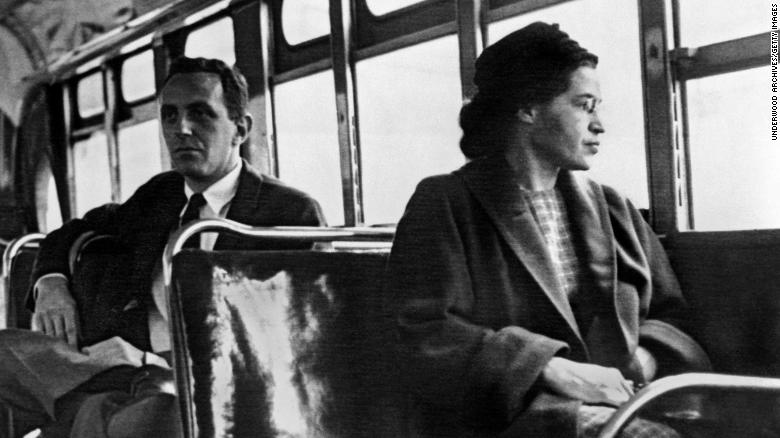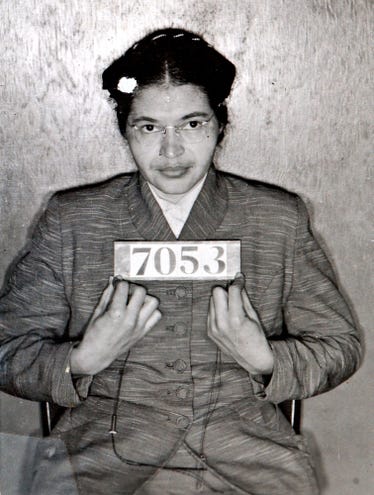Rosa Parks Arrested on Dec. 1, 1955 Ignited the Civil Rights Movement
We should never forget our hero's and we should always remember those that forget our hero's. Előre Dr. Kugler
----------------------------------------
 Rosa Parks seated toward the front of the bus, Montgomery, Alabama, 1956 -- Dec. 1, 1955, 65 years ago, Rosa Parks' arrest ignited the civil rights movement and led to yearlong Montgomery Bus Boycott
Rosa Parks seated toward the front of the bus, Montgomery, Alabama, 1956 -- Dec. 1, 1955, 65 years ago, Rosa Parks' arrest ignited the civil rights movement and led to yearlong Montgomery Bus Boycott
65 years ago, Rosa Parks' arrest ignited the civil rights movement and led to yearlong Montgomery Bus Boycott
by Shannon Heupel
Montgomery Advertiser Nov. 30, 2020
Sixty-five years ago, a civil rights icon’s rise began with five paragraphs buried on the bottom of Page 9 of The Montgomery Advertiser: “Negro jailed here for ‘overlooking’ bus segregation.” That day’s paper had no concept of the history it was covering with the Dec. 1, 1955, arrest of 42-year-old seamstress Rosa Louise McCauley Parks. Under Jim Crow laws, the Tuskegee native had been charged with “ignoring a bus driver who directed her to sit in the rear of the bus.” The story that’s been told through the decades is that Parks didn’t move because she was was physically tired. She later said that wasn’t the case. She was actually tired of being treated like that.
Parks, who sat in the front of the section for Blacks, was one of the Black passengers whom bus driver J.F. Blake told to move to the back of the bus “to equalize the seating.” He could do that because Montgomery gave police powers to bus drivers to enforce segregation. Parks and Blake also had a previous encounter 12 years earlier when he stopped Parks from entering the front of his bus. Parks was active in both the NAACP as the secretary of the Alabama and Montgomery chapters, and she was part of the Montgomery Improvement Association. But her arrest wasn’t a planned event. “I got on it to go home,” Parks told The Advertiser years later. Rallying to the cause and the beginning of the Montgomery Bus Boycott
On Dec. 4, Parks made the Advertiser’s front page, the day after thousands of letters were distributed calling on Black riders to refrain from riding city buses. The boycott was just supposed to last a day. Instead, it lasted for more than a year. By Dec. 6, the boycott took over much of the Advertiser's front page, with photos and a story describing “an estimated 5,000 hymn-singing Negroes” packing the church meeting. That issue also covered Parks’ five-minute court appearance, where she was represented by attorneys Fred Gray and Charles Langford. Parks was fined $14 for violating a state segregation law. On Dec. 9, the Advertiser reported that the Rev. Martin Luther King Jr. spoke for boycotters in a meeting with bus officials. What King asked for was “first come-first served” seating, with whites still loading into the front and Black passengers in the rear. He also sought more courtesy from the drivers and the hiring of Black drivers. No agreement was reached.
The boycott didn't end until Dec. 20, 1956, after the U.S. Supreme Court’s ruling outlawed segregation on city buses. Rosa Parks' bus arrest wasn't the first and had a heavy cost for Parks
Parks wasn’t the first Black bus rider to get arrested for not leaving a bus seat in Montgomery. Fifteen-year-old Claudette Colvin did the same thing nine months earlier. However, the pregnant teen wasn’t seen by the NAACP as someone a movement could be rallied around. The desegregation victory for Black bus riders came with a heavy cost for Parks, who lost her job at a department store. Her husband also was fired. The couple moved to Detroit, where Parks built a new life working for U.S. Rep. John Conyers' office.
Rosa Parks is an icon whose legacy goes beyond the Dec. 1, 1955, arrest
On Oct. 24, 2005, Parks died in Detroit.
In her life, she was honored with the Martin Luther King Jr. Award and by the NAACP with the Spingarn Medal.
In 1996, President Bill Clinton awarded her the Presidential Medal of Freedom, the nation's highest honor for a civilian.  Booking photo of Parks following her February 1956 arrest during the Montgomery bus boycott -- -- Dec. 1, 1955, 65 years ago, Rosa Parks' arrest ignited the civil rights movement and led to yearlong Montgomery Bus Boycott
Booking photo of Parks following her February 1956 arrest during the Montgomery bus boycott -- -- Dec. 1, 1955, 65 years ago, Rosa Parks' arrest ignited the civil rights movement and led to yearlong Montgomery Bus Boycott
Rosa Parks Museum
In commemoration of the 65th anniversary, the Rosa Parks Museum in Montgomery is offering free admission Dec. 1-5, the day of Mrs. Parks' arrest to the day that the boycott began. More information can be found at troy.edu. Contact Montgomery Advertiser reporter Shannon Heupel at sheupel@gannett.com.
https://www.montgomeryadvertiser.com/.../rosa.../6462733002/

